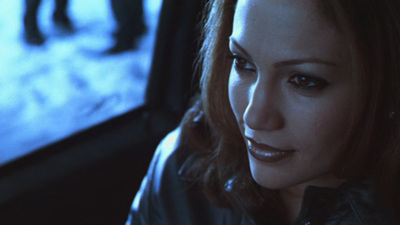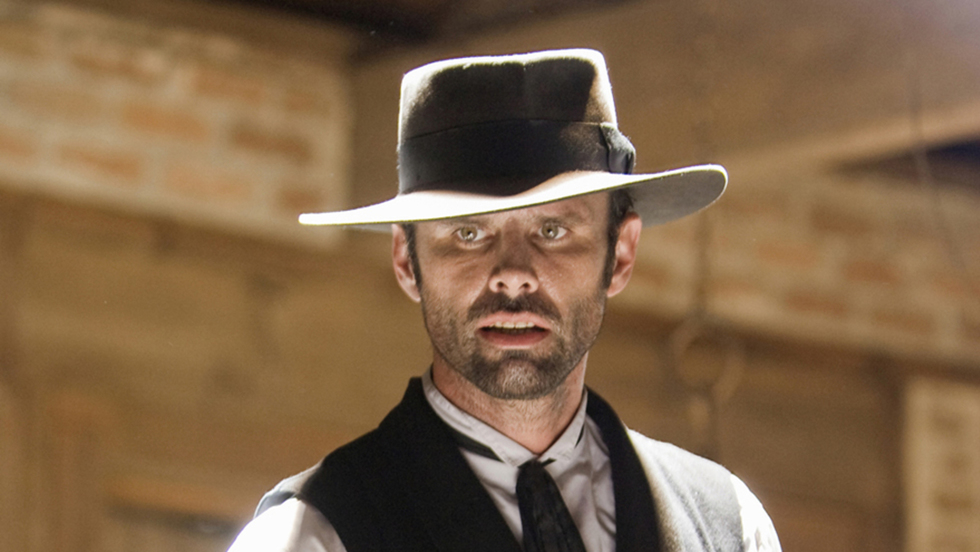
BY KAREN KEMMERLE |
Walton Goggins on Spielberg, Tarantino, and “Django Unchained”
From the third season of the critically acclaimed TV show “Justified” to supporting roles in “Lincoln” and “Django Unchained,” Walton Goggins talks to Tribeca about his banner year.

Walton Goggins just has one of those faces that audiences remember. From his work on television shows like The Shield and Justified to his big screen supporting roles in films like The Apostle, Predators, and That Evening Sun, he has long been recognized as one of Hollywood’s finest character actors. In 2012, he had notable roles in both Lincoln and Django Unchained, joining casts that included James Spader, Tommy Lee Jones, Daniel Day-Lewis, Jamie Foxx, and Leonardo DiCaprio (just to name a few).
Both films are sure to be Oscar contenders, and both feature Goggins in very different roles. In Steven Spielberg's Lincoln, he plays a conflicted Congressman who casts one of the deciding votes in support of the passage of the the 13th amendment. In Django Unchained, he plays the terrifying villain Billy Crash who embodies of the cruelty of racism. One of Crash’s more gut-wrenching atrocities is reminiscent of a similar one in Reservoir Dogs (you know what I am talking about).
We recently sat down with the multi-faceted star to discuss working with Quentin Tarantino, transitioning between television and film, the physicality of his performances, and all things Django Unchained.
Tribeca: 2012 has been a big year for you: the third season of Justified, a stunning guest appearance in Sons of Anarchy, and supporting roles in two different blockbusters. Is it challenging to go back and forth between television and film?
Walton Goggins: Because television has come to the place it is at, working in that medium is not that different from working in film. You watch an episode of Boardwalk Empire, that’s almost like a movie. Nowadays, a 13-episode season is like a 13-hour movie. In some ways, it helps to have experience in both places. The schedule we keep on Justified and the schedule I kept on The Shield required us to film one episode in just 7 days. You become used to working in a way that requires you to get it right—on either the first or second take—because there’s just not enough time. And if you want to be proud of your work, you damn sure better get it right on the first or second take.
It’s interesting that you bring up this question because you are reminding me of a scene I ran through with Leo that didn’t ultimately make it in the movie. It was a five-page scene in which dialogue just went back and forth between us. I had just gotten the role and we were out on the set and he asked me if I wanted to run the lines. I said, “Sure, if you want.” After we had finished, he just said, “Television’s in the house!” Just like that! You exercise that muscle, you look at a page, and it’s all about getting away from the written word and projecting the true meaning behind the dialogue on the screen. You just have to do that much quicker in TV than film.
Tribeca: Django Unchained deals with many tough themes including slavery, racism, and violence against the helpless but with a twisted sense of humor. Many parts of the film will be difficult for audiences to watch. What were your first reactions to the script?
Walton Goggins: I was just blown away by it. I didn’t have an opportunity to read the Pulp Fiction script or others of his other great works, but I’m pretty sure I would have felt the same way about them. This was the first time I was given a Quentin Tarantino script, and I was just speechless. I could not believe that this man was capable of making me laugh and cry throughout the entire script. The description of what was happening was just so powerful. I just thought to myself that he’s going to do this movie and it’s going to start a revolution.

Tribeca: I saw the film at a press screening where audiences are known to be stone-faced and impartial. However, during Django, people reacted by laughing or participating in some other way. During the more brutal points of the film, you could literally sense people’s breath tightening.
Walton Goggins: That does not surprise me. Thinking about it now, I’m worry that no one will actually see my performance because they will have their hands over their eyes the whole time [laughs]. It’s just so brutal.
Tribeca: Can you describe your first meeting with Quentin Tarantino? Did the audition process differ from other projects you’ve worked on?
Walton Goggins: Well, I had reached out through a couple of mutual friends to let Quentin know I was interested in working with him, and I heard back that I had actually been on his radar for quite some time. One of our mutual friends was hosting a barbeque that we both attended, and Quentin and I were able to have a long conversation about movies and Django. Quentin told me that he wanted me to come in and talk about Django more, but told me to read the script again and continue to think about where I wanted to fit into the script. At the time, there was a character named Ace Woody, that was to be played by Kevin Costner, and that was the role I wanted, of course. However, you’re not going to re-cast Costner for me! [laughs]
I walked into the room with Quentin holding about 40-50 pages of the script, and I set out to read as many characters as I could. You never know how many opportunities you’re going to get to read Quentin Tarantino’s words out loud to the man himself,so I just went for it. As fate would have it, I got the role of Billy Crash. Due to scheduling conflicts with Costner and Kurt Russell, major aspects of Ace Woody were absorbed into the Billy Crash role, so it was just an incredible turn of events. I’m just so grateful for the opportunity.
Tribeca: Among all the ruthless characters featured in Django Unchained, Billy Crash stands out. Could you talk about the character and the preparation you put into the role?
Walton Goggins: The genesis of any character for me really begins with the script. It’s just a matter of reading the script over and over and over and over again. That’s how I determine the path into the story and into my character. I also read a lot about slavery. I’m from the South so I was very familiar with this time period in our nation’s story. I had actually read Team of Rivals, the book that Lincoln is based on, and I understood all of the political maneuverings that were going on.
In playing Crash, I just wanted to convey what it was like for people who suffered at the hands of slavers. As Quentin and Jamie said, “This is a topic you can’t shy away from. You just have to really go there, no holds barred. Otherwise, there is no point.” As brutal as Billy is and no matter how difficult it was for me to play the role, at the end of the day, I’m playing a character. I’m there to service the story. Billy is a necessary evil.

Tribeca: I was really struck by the way Billy Crash moved. You’re such a physical actor, as your body of work shows. Where does the physicality of your characters come from?
Walton Goggins: In the story, Billy was written to be a counterpart to Django, a worthy opponent and a skillful gunslinger, if you will. I had been given the opportunity to be on set for a couple weeks before I shot my first scene so I was able to watch Jamie as Django. I saw exactly what he did and how he moved while he was holding his gun.
I knew wanted to be as scary and intimidating as I possibly could so that I could believably challenge Jamie. To achieve that, I knew Billy was a guy who wasted no energy or motions as he pulled his gun out, shot it, and put it back in the holster. I wanted him to be almost graceful, almost like he was a feather, because he was doing such horrible things.
As soon as I put the boots and spurs on, it wasn’t difficult. Quentin actually gave me the biggest spurs possible, and as soon as I heard the sound of them jingling, it was over for me. You hear that sound on set and you knew Billy Crash was coming. As Billy Crash walked through that plantation, there was no doubt that he was the head slaver. So there was an ease and an elegance I wanted to bring to this guy to juxtapose with his horrible actions.
Tribeca: From Django to Justified to Cowboy & Aliens and others, you have appeared in many westerns. What draws you to the genre?
Walton Goggins: Well, opportunity for one thing [laughs]. However, I’ve gotten the opportunity to do a lot of different things in the past few years. Predators is a movie I’ve really proud of.
Tribeca: It’s a great movie.
Walton Goggins: It’s a fucking great movie. There’s nothing cowboy about the character of Stans that I played. He’s funny as shit and is a vehicle for action type-humor. With a couple of projects I have coming up, I really had the chance to step outside these roles that I’ve kind of been known for.
As for what draws me to the westerns, they are something I really enjoy. Plus, I think at the end of the day, I do look a certain way. People associate me with being a man, a real man in the vein of Tommy Lee Jones, Robert Duvall or Ed Harris, who are just these chiseled, beautiful men. However, I think they only see the chiseled part of me, not the beautiful [laughs].

Tribeca: When you play a character as rich as Boyd Crowder on Justified or Shane Vendrell on The Shield , is it hard to find roles that creatively satisfy you?
Walton Goggins: It is. It can be very challenging. It’s an unfair comparison in some ways because on a series you can have upwards to 84 hours to tell a complete story. It’s really difficult to find that same kind of satisfaction in a movie, unless you are a lead, and even then, you have only have two hours to complete that character’s arc.
If you’re not the lead, it’s very difficult to find a role that allows you to express yourself three dimensionally. It’s actually a challenge that I look forward to in a way. I really like the opportunity to make a character, who may have 10 or 20 scenes or even as few as 3, memorable for audiences.
Tribeca: So last question, who is a more intimidating director, Steven Spielberg or Quentin Tarantino?
Walton Goggins: You know, I wouldn’t use the word intimidating to describe either one of them. What I can say is that it was intimidating to meet both Quentin Tarantino and Steve Spielberg for the first time. However, they are both so gracious that they go to great lengths to make you feel comfortable. They act like all kind and talented artists act.
Django Unchained will be in wide release starting Christmas Day.
![]() Like Django Unchained on Facebook
Like Django Unchained on Facebook
